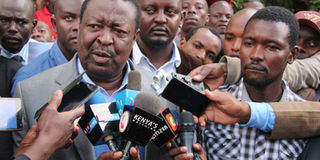Nasa points finger at envoys in election row

Nasa co-principal Musalia Mudavadi speaks about the boycott of some companies' products outside an Airtel shop in Nairobi on November 6, 2017. Nasa accuses foreign envoys of bias in addressing the political stalemate. PHOTO | KANYIRI WAHITO | NATION MEDIA GROUP
What you need to know:
- Mr Mudavadi narrowed down to Mr Robert Godec, the US ambassador, and UK High Commissioner Nic Hailey.
- The envoys also tried to intervene as the opposition escalated its demands for “irreducible minimums” before the repeat election.
Nasa’s claim that the electoral commission was being influenced by foreign envoys in the run-up to the repeat election marks the further deterioration of relations between the coalition’s leadership and Western countries.
The allegation is contained in the opposition’s response to a petition filed at the Supreme Court by activists challenging the re-election of President Uhuru Kenyatta and its accompanying affidavit by the coalition’s co-principal Musalia Mudavadi.
Mr Mudavadi said the Independent Electoral and Boundaries Commission (IEBC) and its chairman Wafula Chebukati “also fell under the improper influence of various foreign envoys”.
ROBERT GODEC
Opposition leader Raila Odinga’s chief agent then narrowed down to Mr Robert Godec, the US ambassador, and UK High Commissioner Nic Hailey.
He said they “on many occasions acted as the public relations officers of Mr Chebukati and the IEBC”.
Nasa’s assertion was that even after Mr Chebukati’s statement on October 18 that the circumstances in place could not enable him to conduct a credible election, the envoys insisted the repeat poll had to happen.
BIAS
Nasa pointed out that two days after Mr Chebukati made this admission, the envoys stated that they believed IEBC could still carry out a good election and it was on that basis that the election was held.
The coalition’s attacks on the envoys came just days after Mr Odinga told an audience in Washington DC that Mr Godec needed help from other arms of the US government in engaging with Kenya.
He was frustrated with the envoys in Nairobi, he said, and asserted that they had sometimes contributed to the crisis.
On Monday, Ford-Kenya deputy party leader Boni Khalwale argued that Mr Odinga’s push for a more robust and direct engagement of the western nations was in search of neutrality that he said was becoming elusive in the Kenyan democratic space.
“We are just re-affirming the fact that either those western envoys do not understand what is going on or have deliberately decided to take sides, irrespective of the truth,” Dr Khalwale, a member of the Nasa coordinating committee, said.
US VISIT
Former Machakos Senator Johnson Muthama, also a member of the committee, claimed that even when the West made statements that were seen to support Mr Odinga’s bid, they were — behind the scenes — backing President Kenyatta.
“Raila is being blocked because of the independence of his mind, because he cannot be controlled by any foreign power,” Mr Muthama said.
The opposition has explained that Mr Odinga’s trip abroad has been to seek direct support and explain his actions to a larger audience and “without the filtering the envoys are bound to do”.
The former prime minister met Mr Yamamoto Donald, the assistant secretary of State for African Affairs in the US administration, Mr Michael Phelan, the director of senate foreign relations committee, and Mr Greg Simpkins, director of House of Representatives subcommittee on Africa.
IEBC
Further, he has also met US Senator Christopher Coons, one of the most influential voices in the senate on Africa, and who chairs the House Foreign Relations Sub-Committee on African Affairs.
He will also be stopping in London on his way back to Kenya, with his original return date shifted from Thursday to Friday.
Foreign envoys in Kenya have been busy over the past two years, helping get President Kenyatta to agree to negotiations that ended with the exit of former electoral commissioners from the agency then led by chairman Issack Hassan.
In the days before Nasa decided to challenge the result of the August 8 election at the Supreme Court, the UK, the US and the European Union exerted pressure on its leaders to seek a solution in court rather than the mass protests Mr Odinga and others reportedly wanted.
NASA'S DEMANDS
EU election observation mission boss Marietje Schaake confirmed at the time that she held meetings with the opposition chiefs.
The envoys also tried to intervene as the opposition escalated its demands for “irreducible minimums” before the repeat election.
In early October, they were reported to have reached out to Mr Odinga to scale down his demands and calls for mass protests to force changes at the electoral commission.






